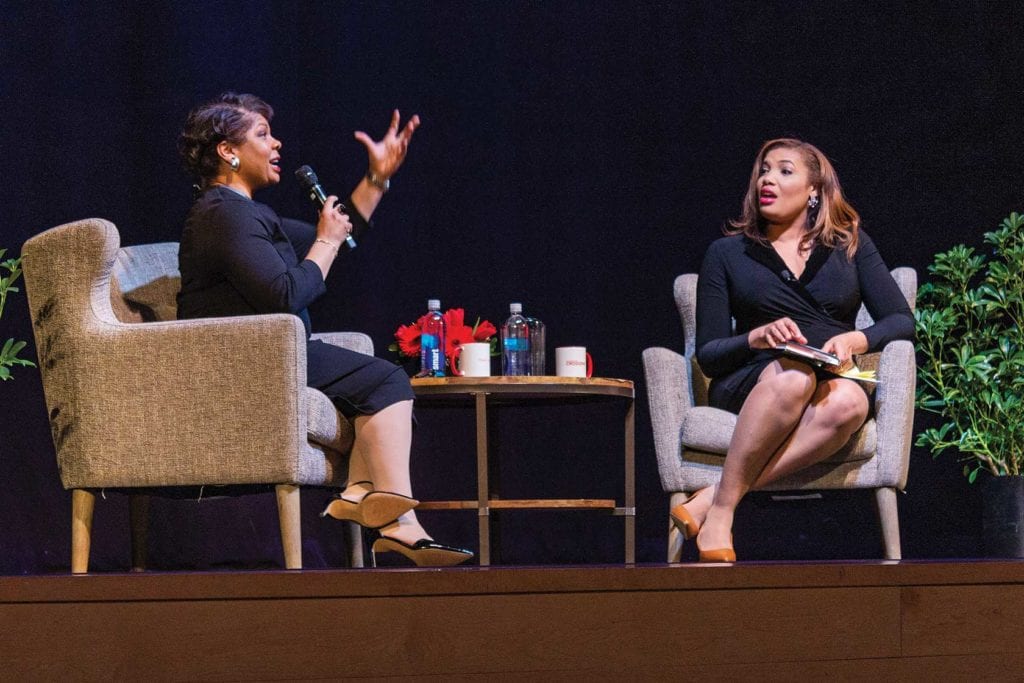April Ryan speaks about Trump backlash
On book tour at Northeastern, Ryan shares stories from White House

Journalist April Ryan has endured a lot of backlash since the beginning of the Trump presidency, and she wants the nation to hear her side of the story.
“I didn’t realize how bad it was,” Ryan said in a question-and-answer session Friday at Northeastern University, where she was promoting her third book, “Under Fire: Reporting from the Front Lines of the Trump White House,” which came out in August 2018.
Ryan has been a White House correspondent for 22 years, experiencing the administrations of Presidents Bill Clinton, George W. Bush, Barack Obama and Donald Trump from the inside. At Trump’s first official press conference as president in 2017, Ryan went viral for an interaction where she asked Trump if he would consult the Congressional Black Caucus on urban crime, and he responded by telling her to set up the meeting.
Since then, Ryan has had more viral moments, including being reprimanded by then-Press Secretary Sean Spicer for shaking her head in disbelief during a press briefing and for openly asking the president if he was a racist on Martin Luther King Day in 2018.
She explained that these incidents, while distressing in the moment, didn’t immediately seem to her as being racially motivated until she looked back on them afterwards.
Ryan, who has received death threats and now employs a bodyguard to protect her, isn’t the only journalist to have experienced barriers and pushback under Trump. She noted the vehemence with which Trump speaks about the news media, a tone which has spread to his supporters.
“The most important piece was the hatred of the press,” she said. “Enemy of the people? Why? Because you don’t like the truth that we’re telling about you?”
However, she did emphasize that not all of the issues with press relations started under Trump. As a black journalist, Ryan has faced difficulty getting close to sources in the White House and the rest of the federal government throughout her years in the field.
“In the black press, or if you’re black in mainstream media, sometimes certain parties or certain people look at you differently. They’re not willing to talk to you as much,” Ryan said.
Black people across the country are facing the challenges of the Trump presidency, a fact which has not escaped Ryan’s notice in the least. She attributed this to the president’s disregard for populations of color, something that started during his candidacy.
Ryan told the audience about a meeting she was invited to for black reporters at the Republican National Convention in early 2016, where she was told by Spicer (then RNC communications director) that candidate Trump, if selected as the nominee, would only need to look at the data to realize that he needed the black vote to win — a statement that shocks her, looking back on Spicer’s confidence that Trump could be managed.
The Republican Party’s support for the president has fluctuated over time as well, although Ryan let listeners in on the secret that many Republicans are not as staunchly devoted to him as they outwardly act.
“In Washington, they will call him every kind of name, they’ll talk about how he’s crazy, blah blah blah, off the record,” Ryan said. “But on the record, they’re very supportive. In Washington, it’s all about the numbers. If those numbers tank, they are walking away from him.”
Perhaps this isn’t surprising, given Trump’s uneven record of support for the party itself. Before becoming the Republican nominee, the billionaire businessman and reality TV star supported many Democratic candidates, often giving financial support to campaigns.
Ryan relayed a memory of being at a campaign fundraiser for her cousin, Democratic New York Congressman Ed Towns, where Trump, who also attended, spent much of the time chatting up then-President Bill Clinton.
“Twenty years ago he wasn’t like this,” Ryan said. “He wanted to be president and he got there the way he could.”
In 2019, the black unemployment rate is at an all-time low, though is still double that of white Americans. Ryan appreciates this fact, but doesn’t credit them to anything the president has done.
“The black and brown unemployment rates are falling right now as the president is just walking along not doing anything,” Ryan said. “Imagine if there was a targeted approach. There would be equity.”
Ryan has not given up on holding the president accountable, but it isn’t easy when her every move is attacked. She emphasized that for the important stories to be told, more journalists from minority communities need to be brought to the table to tell them.
“It is a sad day that any reporter has to ask a sitting United States president if you are a racist,” she said.






